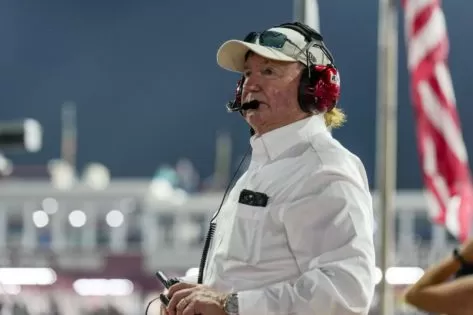NASCAR Penalty: Richard Childress’ Star Driver Faces Race Ban Weeks Before Playoffs
NASCAR is a sport that is known for its high-speed races, intense rivalries, and nail-biting finishes. But with all the excitement and adrenaline rush, there is also a fine line between calculated aggression and reckless retaliation. This line has been a topic of debate in the NASCAR community for years, and it was brought to the forefront once again when Austin Cindric, a rising star in the sport, was penalized for his actions at the Circuit of the Americas (COTA) race just weeks before the playoffs.
Cindric, who drives for Team Penske, made headlines when he intentionally hooked Ty Dillon’s car in the closing laps of the COTA race. The move caused Dillon to spin out and lose valuable positions, ultimately costing him a chance at a top finish. Cindric’s actions were deemed as a clear case of retaliation, and NASCAR wasted no time in penalizing him for his actions.
The penalty handed down by NASCAR was severe, to say the least. Cindric was not only docked 25 driver points, but he was also fined $25,000 and suspended for the next race at Watkins Glen. This punishment came as a shock to many, as Cindric is a star driver for Richard Childress Racing, one of the most successful teams in NASCAR. The suspension also puts Cindric’s chances of making it to the playoffs in jeopardy, as he currently sits on the bubble with just a few races left before the cut-off.
The decision to penalize Cindric has sparked a heated debate among fans and experts alike. Some argue that NASCAR was too harsh in their punishment, while others believe that it was necessary to maintain the integrity of the sport. But one thing is for sure, this incident has once again brought to light the issue of retaliation in NASCAR.
Retaliation has been a part of NASCAR since its inception. Drivers have always used their cars as weapons to get back at their rivals, and it has often resulted in spectacular crashes and intense rivalries. But in recent years, NASCAR has taken a strong stance against retaliation, and the penalties for such actions have become more severe. This is a step in the right direction, as it promotes fair and clean racing, and ensures the safety of all drivers on the track.
However, there is a fine line between calculated aggression and reckless retaliation, and it is not always easy to determine where one ends and the other begins. In Cindric’s case, he admitted that his move was intentional, and NASCAR agreed. But what about other instances where the line is not so clear? This is where NASCAR needs to be more consistent in their decisions and ensure that all drivers are treated fairly.
The penalty handed down to Cindric also raises questions about the timing of the punishment. With just a few races left before the playoffs, this suspension could potentially cost him a spot in the championship hunt. Some argue that NASCAR should have waited until after the playoffs to penalize Cindric, while others believe that the punishment should have been more severe. But regardless of the timing, the fact remains that Cindric’s actions were unacceptable and needed to be addressed.
As for Richard Childress Racing, this penalty comes as a major blow to their team. Cindric has been their star driver this season, and his absence at Watkins Glen will undoubtedly affect their performance. But as a team with a rich history in NASCAR, they understand the importance of fair play and sportsmanship. They have accepted the penalty and are looking forward to moving on from this incident.
In conclusion, NASCAR’s decision to penalize Austin Cindric for his actions at COTA has once again brought the issue of retaliation to the forefront. While some may argue that the punishment was too harsh, it is a step in the right direction towards promoting fair and clean racing. As for Cindric, this incident serves as a learning experience, and he will undoubtedly come back stronger and more determined to prove himself on the track. Let’s hope that this incident serves as a reminder to all drivers that there is no place for retaliation in NASCAR.

